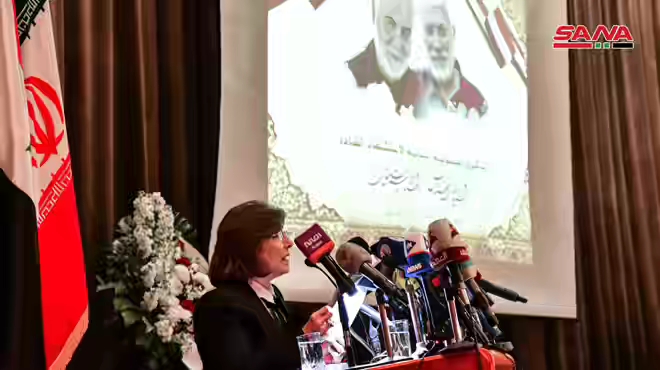Damascus (ST): The Iranian embassy in Damascus held a memorial ceremony to commemorate the second anniversary of the martyrdom of Lieutenant-General Qassem Soleimani and his companions in Al-Assad National Library.
President Bashar al-Assad, in a speech delivered by the Special Adviser at the Republic’s Presidency, said: “On the second anniversary of the martyrdom of Lieutenant-General Qassem Soleimani, commander of the Quds Force in the Iranian Revolutionary Guards, and his comrade in the struggle against terrorism and international tyranny, Abu Mahdi Al-Muhandis, we must stop and ask why a country the size of the United States with its striking military force decided to target a person who considers himself a soldier in this struggle against terrorism and has devoted all military capabilities, manpower and equipment under his command to defeat the forces of terrorism, extremism and bloodshed if he did not pose a threat to the plans and presence of the United States and its Western and local allies, whether in Syria, Lebanon, Iraq, Yemen and occupied Palestine? The equation that prompted the US leaders to commit this heinous crime against the martyr Soleimani and his colleague Al-Muhandis is not purely military but rather goes beyond field borders to intellectual, cultural and moral concepts.
The martyr Soleimani understood the essence of the strategy against the axis of resistance, and worked through every mission he confronted to undermine the foundations of this strategy wherever it was found and by all the means available to him. As long as this strategy called for division and strife among the ranks and followers of the various religions and sects that constitute the historical core of Arab civilization with its diversity, coexistence, General Soleimani and his comrade in arms worked to establish the spirit of the unity of the peoples of the resistance from Iraq to Syria to Lebanon, Palestine and Yemen, as long as the Western strategy has always been hostile to the Arabs for a thousand years has relied on buying off traitors and agents and tempting its followers with money and gains. In this world, Soleimani worked to instill the spirit of sacrifice and redemption for the homeland among those under his leadership and set for them the ideal of asceticism in this world and greed only for martyrdom and sincere work to accumulate good deeds and jihad for the sake of God, homeland and people without seeking reward or thanks from anyone. His presence was in the fields where his outstanding leadership abilities appear, and not on the media screens.
As long as the hostile strategy that targets us all focused on its followers from rulers and governments and on subordination and obedience to orders coming from abroad, Commander Soleimani worked to extract his strategy from place and time and according to the requirements of the battle, guided by a live conscience and a soul eager to complete the mission or obtain martyrdom. Because he himself represented everything he called for, and because he was doing what he said and living what he was trying to instill in the souls of the resistance fighters who left their lives and their families in defense of honor, homeland and religion, and because he considered himself a soldier in this sacred battle, he treats his comrades with the logic of brotherhood and love and the sympathy and understanding that has been rare. Commander Soleimani and his comrade the martyr Al-Muhandis, in their exceptional leadership talents, constituted an Islamic and Arab military, political, cultural and moral phenomenon.
If we recall the attacks carried out by the United States in its history, which were carried out by Israel, the occupation entity in our region, we find that the main reason behind these targeting is the fear of the spread of the model that threatens the essence of their political, military, cultural or moral identity, or all of these together. This was crystal clear in the targeting of Martin Luther King, Indira Gandhi and the extermination of her family, the extermination of Zulfikar Ali Bhutto and his family, Ghassan Kanafani, Naji Al-Ali, Abu Jihad, Abu Iyad, Che Guevara, Allende, and countless honorable Palestinian, Arab and international militants who worked with great vision and sincerity against imperialist goals and against occupation and settlement, against the colonization of peoples and the underestimation of their dignity and capabilities.
For his part, Iranian Ambassador in Damascus, Mehdi Sobhani, said that the name of the resistance axis has been closely linked and mixed with the name of Qasem Soleimani, adding that Iran has been able to confront the US hegemony and policies.
During the ceremony, a documentary film that revolves around Soleimani’s life was screened.
K.Q.

